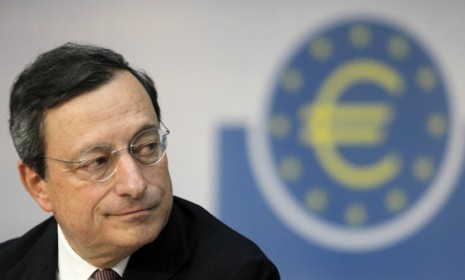Global rate cuts: Are central banks bracing for economic calamity?
Europe and China slash interest rates, and Britain says it will essentially print money — raising fears that the world's top bankers are entering "panic mode"

A free daily email with the biggest news stories of the day – and the best features from TheWeek.com
You are now subscribed
Your newsletter sign-up was successful
In one wild hour on Thursday, central banks in Europe and China slashed interest rates, hoping to encourage businesses and consumers to borrow — and spend — more. At the same time, the Bank of England renewed an economic stimulus program it had suspended just two months ago. And here in the U.S., it was only two weeks ago that the Federal Reserve announced that it would extend a similar effort. Central bankers insist the moves weren't coordinated. Still, is this flurry of activity a sign that the world's financial leaders are starting to panic in the face of a scary global slowdown? Here, a brief guide:
What exactly did the central banks do?
The European Central Bank and its counterpart in China cut their benchmark lending rates, hoping to get businesses and consumers to spend more by making it cheaper for them to borrow money. The ECB cut its benchmark interest rate by a quarter point, to 0.75 percent. That's the lowest rate in its 14-year history. But because European rates are already so low, economists don't expect additional reductions to make much of a difference. China might have more influence. Its rates are relatively high, at 6 percent, so analysts think its 0.31 percentage point cut might help counter a sharp economic slowdown.
The Week
Escape your echo chamber. Get the facts behind the news, plus analysis from multiple perspectives.

Sign up for The Week's Free Newsletters
From our morning news briefing to a weekly Good News Newsletter, get the best of The Week delivered directly to your inbox.
From our morning news briefing to a weekly Good News Newsletter, get the best of The Week delivered directly to your inbox.
How about the Bank of England?
The British central bank can't push interest rates much lower than the current 0.5 percent, so it announced that it would buy up $78 billion worth of government bonds (it already holds $508 billion worth), essentially printing money to pay for it. This move, known as quantitative easing, increases the money supply, giving banks more to lend. Though such monetary policies can inadvertently spark inflation, this measure is meant to encourage more buying, selling, and investing, which is why America's Federal Reserve has been doing similiar things.
Will it work?
That's the big question. Stock markets aren't persuaded, as global stocks eased back Thursday after an initial burst of enthusiasm. And opinions range from somewhat optimistic — "This is helpful at the margins," says one British economist — to downright dismissive — "There's virtually zero chance of that succeeding," Bill Smead, CEO of Smead Capital Management, tells CNBC Asia. The task ahead is huge: Europe is mired in a double-dip recession, and its frightening debt crisis is dragging down economies around the world; the U.S. recovery is withering; and long-booming China, which has propped up the global economy for years, is experiencing a sharp slowdown.
A free daily email with the biggest news stories of the day – and the best features from TheWeek.com
Why are all of these central banks acting now?
This is a sign that central bankers are on the job, Charles Dallara of the Institute of International Finance tells CNBC Asia. "The global environment is weakening" and the central bankers are taking positive steps to ease the pain, although they can't "alter fundamentally" the coming storm. The ECB knew it had to do something to avert an immediate meltdown, says Paul Krugman at The New York Times, but the fact that it did the "minimal amount" instead of making it clear a solution is coming only shows it isn't recognizing the gravity of the situation. This is the second time in a month the central planners in Beijing have offered rate relief, says Matt Nesto at Yahoo Finance. That's really, really rare. These extraordinary measures aren't soothing — they're a sign the people sitting in the world's financial control rooms have gone into "panic mode."
Sources: CNBC, Marketwatch, New York Times (2), Yahoo Finance
-
 Crisis in Cuba: a ‘golden opportunity’ for Washington?
Crisis in Cuba: a ‘golden opportunity’ for Washington?Talking Point The Trump administration is applying the pressure, and with Latin America swinging to the right, Havana is becoming more ‘politically isolated’
-
 5 thoroughly redacted cartoons about Pam Bondi protecting predators
5 thoroughly redacted cartoons about Pam Bondi protecting predatorsCartoons Artists take on the real victim, types of protection, and more
-
 Palestine Action and the trouble with defining terrorism
Palestine Action and the trouble with defining terrorismIn the Spotlight The issues with proscribing the group ‘became apparent as soon as the police began putting it into practice’